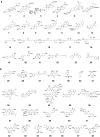Cancer is a preventable disease that requires major lifestyle changes
- PMID: 18626751
- PMCID: PMC2515569
- DOI: 10.1007/s11095-008-9661-9
Cancer is a preventable disease that requires major lifestyle changes
Erratum in
- Pharm Res. 2008 Sep;25(9):2200. Kunnumakara, Ajaikumar B [corrected to Kunnumakkara, Ajaikumar B]
Abstract
This year, more than 1 million Americans and more than 10 million people worldwide are expected to be diagnosed with cancer, a disease commonly believed to be preventable. Only 5-10% of all cancer cases can be attributed to genetic defects, whereas the remaining 90-95% have their roots in the environment and lifestyle. The lifestyle factors include cigarette smoking, diet (fried foods, red meat), alcohol, sun exposure, environmental pollutants, infections, stress, obesity, and physical inactivity. The evidence indicates that of all cancer-related deaths, almost 25-30% are due to tobacco, as many as 30-35% are linked to diet, about 15-20% are due to infections, and the remaining percentage are due to other factors like radiation, stress, physical activity, environmental pollutants etc. Therefore, cancer prevention requires smoking cessation, increased ingestion of fruits and vegetables, moderate use of alcohol, caloric restriction, exercise, avoidance of direct exposure to sunlight, minimal meat consumption, use of whole grains, use of vaccinations, and regular check-ups. In this review, we present evidence that inflammation is the link between the agents/factors that cause cancer and the agents that prevent it. In addition, we provide evidence that cancer is a preventable disease that requires major lifestyle changes.
Figures










References
-
- L. N. Kolonel, D. Altshuler, and B. E. Henderson. The multiethnic cohort study: exploring genes, lifestyle and cancer risk. Nat. Rev. Cancer. 4:519–27 (2004) doi:10.1038/nrc1389. - PubMed
-
- J. K. Wiencke. Impact of race/ethnicity on molecular pathways in human cancer. Nat. Rev. Cancer. 4:79–84 (2004) doi:10.1038/nrc1257. - PubMed
-
- R. G. Ziegler, R. N. Hoover, M. C. Pike, A. Hildesheim, A. M. Nomura, D. W. West, A. H. Wu-Williams, L. N. Kolonel, P. L. Horn-Ross, J. F. Rosenthal, and M. B. Hyer. Migration patterns and breast cancer risk in Asian-American women. J. Natl. Cancer Inst.85:1819–27 (1993) doi:10.1093/jnci/85.22.1819. - PubMed
-
- W. Haenszel and M. Kurihara. Studies of Japanese migrants. I. Mortality from cancer and other diseases among Japanese in the United States. J. Natl. Cancer Inst.40:43–68 (1968). - PubMed
-
- A. S. Hamilton and T. M. Mack. Puberty and genetic susceptibility to breast cancer in a case-control study in twins. N. Engl. J. Med.348:2313–22 (2003) doi:10.1056/NEJMoa021293. - PubMed
Publication types
MeSH terms
Substances
LinkOut - more resources
Full Text Sources
Other Literature Sources

